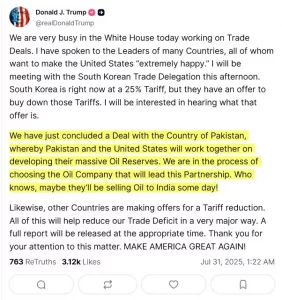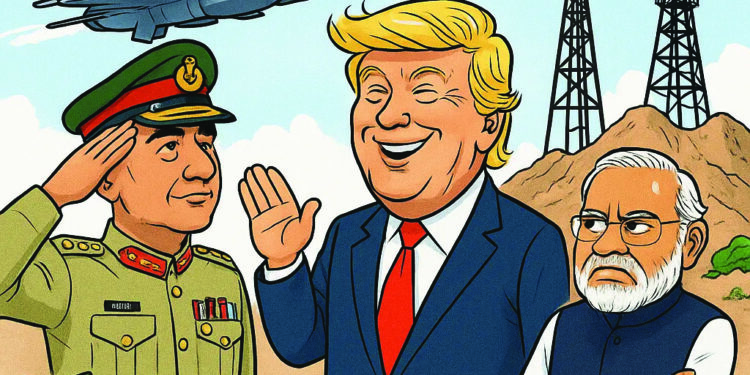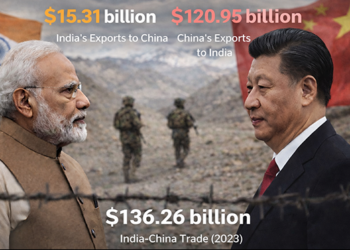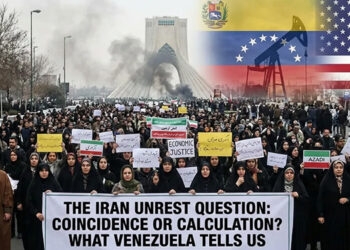As Washington pivots towards Islamabad with an energy-centric deal, India faces new questions on tariffs, regional security, and the volatile geopolitics of Balochistan along its hostile western front.
A Surprise U.S.–Pakistan Energy Partnership
President Donald Trump’s late-night announcement of a new U.S.–Pakistan deal to jointly develop Pakistan’s oil reserves has injected fresh complexity into South Asian geopolitics. Beyond the optics of Washington’s renewed embrace of Islamabad, the deal carries implications far beyond its stated aim of energy development. Trump’s remark that such oil might one day be sold to India adds an unexpected dimension—one that intersects directly with New Delhi’s looming trade clash with Washington and its broader foreign policy outlook.
Pakistan’s Resource Landscape: Oil, Gas and Minerals
Despite Trump’s reference to “massive oil reserves,” Pakistan’s conventional crude output remains modest by global standards. The country’s proven reserves stand at roughly 238 million barrels, a sliver compared to Middle Eastern producers. Where Pakistan’s real promise lies is in its natural gas wealth (an estimated 18 trillion cubic feet) and technically recoverable shale oil deposits, pegged at about 9 billion barrels, concentrated largely in Balochistan’s under-explored basins.
Balochistan, however, is both an energy frontier and a political tinderbox. The province hosts vast mineral deposits—copper, gold, and chromite among them—and is crisscrossed by energy infrastructure linked to the China-Pakistan Economic Corridor (CPEC). It is also home to a decades-long insurgency, with groups like the Baloch Liberation Army targeting pipelines, mines, and foreign contractors. Any U.S.-led oil and gas project here would therefore be as much a test of Islamabad’s internal security capacity as it would be of its resource potential.
Trade and Defence Ties: Setting the Baseline
Understanding the significance of this new energy push requires revisiting the current U.S.–Pakistan economic and strategic relationship. Bilateral trade remains narrow and predictable:
- From Pakistan to the U.S.: The dominant exports are textile-driven, led by knitwear apparel (around $1.6 billion annually), home textiles and miscellaneous garments (about $1.58 billion), and woven apparel (roughly $1.14 billion). These categories make up the lion’s share of Pakistan’s export basket to the U.S., reinforcing its status as a low-cost garment hub.
- From the U.S. to Pakistan: American exports include raw cotton (around $772 million)—ironically feeding Pakistan’s own textile mills—alongside iron and steel products (about $406 million), machinery and equipment (roughly $141 million), and aircraft and spare parts (close to $94 million). Energy products and high-end technology remain largely absent from this trade profile.
In terms of defence cooperation, U.S. arms transfers to Pakistan have been in long-term decline. Since 2011, Washington has restricted sales to limited sustainment packages, the most notable being a $450 million F-16 maintenance deal in 2022. Today, Pakistan’s defence imports are overwhelmingly sourced from China, reflecting the waning salience of U.S. military aid in bilateral ties. This context underscores why Trump’s pivot toward energy—and away from traditional defence or aid-centric engagement—is particularly striking.
Balochistan’s Strategic Centrality and Risks
If U.S. energy majors move into Pakistan, they will inevitably focus on Balochistan’s resource-rich basins and mineral belts. This region already hosts Chinese-backed projects under CPEC and is strategically linked to Gwadar Port, China’s Arabian Sea outlet. However, insurgent activity has repeatedly disrupted projects, targeting foreign workers and energy installations alike. For the Baloch nationalist movement, U.S.-led resource development could become another rallying point against what they perceive as external exploitation. Washington’s involvement will thus carry not only commercial risks but also broader geopolitical reverberations, potentially complicating both China’s and Pakistan’s plans for the province.
Implications for India: Tariffs, Energy, and Negotiating Strategy
For India, this announcement lands at a precarious moment. With U.S. tariffs of 25 % set to take effect on its exports from August 1, New Delhi faces a double challenge: blunt the immediate blow of these trade penalties while recalibrating to an altered regional energy map. Trump’s suggestion that oil developed in Pakistan under U.S. management could one day be sold to India opens up both opportunities and dilemmas.
On the one hand, access to such energy could diversify India’s supply, particularly as it continues to balance purchases from Russia amid Western pressure. On the other hand, buying oil originating in Pakistan—even indirectly—would be politically sensitive and strategically fraught. Yet once U.S. companies control the extraction and commercialisation, this energy effectively enters global markets, making it harder for India to ignore if it offers price or logistical advantages.
In negotiations with Washington, India should therefore:
- Integrate energy security into tariff talks: Link market access to broader regional cooperation, pressing for assurances on stable and non-discriminatory U.S.-led energy supply chains.
- Leverage its strategic importance: Emphasise that India’s participation in regional energy arbitrage could align U.S. objectives with New Delhi’s needs, provided trade penalties are softened.
- Guard against overdependence: Balance any engagement on U.S.-developed Pakistani energy with continued diversification, maintaining leverage in case geopolitics shifts again.
Parallel Moves: South Korea’s Template
South Korea’s concurrent negotiations with Washington offer a useful precedent. Seoul is reportedly attempting to “buy down” its own tariff exposure by promising new industrial investments and tech collaborations—particularly in semiconductors and electric batteries. India, with its expanding manufacturing base and deepening role in supply chain diversification, could adopt a similar approach. Linking trade relief to joint initiatives in technology, energy transition, and supply-chain resilience might be the most effective way to offset Trump’s transactional instincts.
India’s Foreign Policy Calibration Going Forward
This new U.S.–Pakistan energy partnership signals that Washington is ready to engage Islamabad in ways that bypass traditional military aid frameworks, using commerce and investment as entry points. For India, it is both a cautionary tale and an opening. The caution lies in the reminder that U.S. strategic commitments can be fluid and opportunistic, even in a region where New Delhi has long assumed primacy in American calculations. The opening, however, lies in the chance to use its economic heft and strategic centrality to steer U.S. choices in directions that align with Indian interests.
Going forward, India’s foreign policy will need to take into account this evolving triangle. Maintai

ning momentum in Indo-U.S. defence and technology ties, hedging on energy diversification, and using its negotiating leverage to neutralise tariffs will be essential. The broader trajectory of U.S.–India relations may now hinge on how deftly New Delhi can both manage Trump’s transactionalism and ensure that any new American footprint in Pakistan is shaped in ways that ultimately reinforce, rather than undercut, India’s strategic standing in the region.
In sum, Trump’s oil deal is more than a headline—it is a stress test for India’s ability to blend hard-nosed trade bargaining with big-picture diplomacy in a rapidly shifting regional order.
(The article first appeared on the author’s blog KBS Chronicles.)








